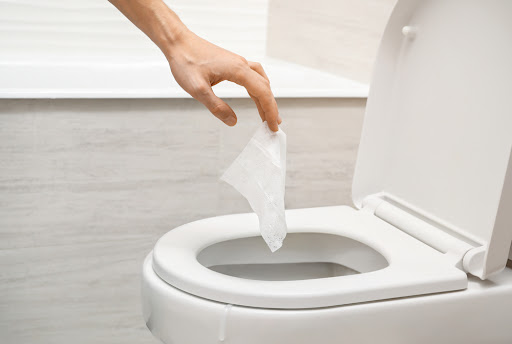We’re here to share some cautionary tales from the toilet. Yes, your humble commode can become a nightmare if you’re not careful about what goes down the drain. We often don’t realize that our every day habits can lead to significant plumbing problems over time. So, sit back, relax, and prepare to be enlightened about the dos and don’ts of toilet etiquette.
Remember, your toilet is not a trashcan. Treat it with care, and it will serve you well for years to come. Proper disposal of waste materials not only saves you from potential plumbing issues but also contributes to a healthier environment.
In case you’re faced with a stubborn blockage, don’t hesitate to call in the experts. Our team at Same Day Plumbing has the knowledge and tools to handle any plumbing predicament, ensuring your pipes flow smoothly again.
The Common Culprits
First, let’s talk about the usual suspects that often find their way down the toilet, causing havoc in your plumbing system.
- Baby Wipes: Despite being labeled as “flushable,” baby wipes are one of the biggest culprits behind clogged pipes. They fail to break down in water like toilet paper and can cause serious blockages. Over time, these wipes can accumulate, creating a formidable mass that’s nearly impossible to dislodge without professional help. It’s a common misconception that just because something can be flushed, it should be. However, this is far from the truth.
- Cotton Balls/Swabs: These fluffy little things might seem harmless, but they bunch together in the pipes, leading to blockages. Cotton balls absorb water and expand, while cotton swabs can get stuck in narrow bends, both contributing to an obstructed flow. It’s easy to think that small items won’t cause a problem, but when they build up over time, they can lead to significant issues.
- Dental Floss: It’s small and thin, but it’s a menace to your plumbing. Dental floss can wrap around other objects, creating nasty clogs. Moreover, being non-biodegradable, it can linger in your pipes or the environment for years. Just like with cotton balls and swabs, the small size of dental floss can deceive you into thinking it’s harmless.
- Feminine Products: Tampons and sanitary pads are designed to absorb, which means they expand in your pipes, causing blockages. Even products marked as ‘flushable’ can take longer to decompose than your plumbing can handle. It’s essential to dispose of these products properly in the trash instead of flushing them down the toilet.
- Cooking Grease/Food Fat: While not flushed down the toilet, grease and fat poured down the sink often end up solidifying in your pipes and causing problems. Over time, this can build up into a stubborn blockage that’s hard to clear. It’s always better to collect cooking grease in a container and dispose of it in the trash.
The Unexpected Troublemakers
Now, let’s move on to some less obvious but equally troublesome items.
- Medications: Flushing expired or unwanted medications may seem like a safe disposal method, but it can contaminate the water supply. Medicines can leach into groundwater, affecting both human health and wildlife. Always follow proper medication disposal guidelines provided by health authorities.
- Cat Litter: Even ‘flushable’ cat litter can cause issues. It clumps together when wet and can cause blockages. Additionally, cat waste can contain harmful parasites that can survive the wastewater treatment process and harm local wildlife. It’s best to dispose of cat litter according to the manufacturer’s instructions.
- Hair: It seems thin and harmless, but hair can accumulate and tangle up in your pipes, leading to serious clogs. Hair doesn’t easily break down and can wrap around other debris, adding to the problem. It’s a good idea to clear hair from shower drains regularly to prevent buildup.
- Cigarette Butts: Not only is this bad for your pipes, but it’s also terrible for the environment. Cigarette butts can contaminate water sources with toxic chemicals. Plus, they’re non-biodegradable and can take years to decompose. It’s essential to dispose of cigarette butts properly in designated waste bins.
- Goldfish: The classic tale of a flushed pet goldfish isn’t just sad; it’s harmful. Goldfish can survive the journey and disrupt local ecosystems. They can outcompete native species for food and habitat, causing irreparable damage.
The Conclusion
The golden rule is simple: If it’s not human waste or toilet paper, don’t flush it down the toilet. Your plumbing system isn’t designed to handle anything else.
At Same Day Plumbing, we’re always ready to tackle any plumbing issue you might face, so don’t hesitate to call us if you need toilet repair in Toronto. However, prevention is always better than cure. So, next time you’re about to flush something down the toilet, don’t forget these tales from the toilet.
Ultimately, being mindful of what goes down the drain can save you time, money, and the need for a drain cleaning service. So, heed these tales from the toilet and keep your plumbing in top shape!
Remember, the stories we shared are not just tales but real-life experiences of many homeowners. Let’s learn from their experiences and take proactive steps to maintain our plumbing systems. Your actions today can prevent the nightmares of tomorrow.


